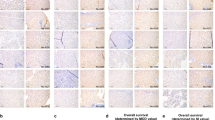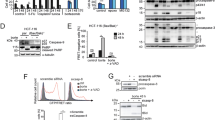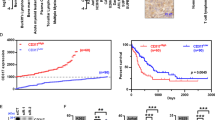Abstract
Resistance to drug treatments underlies the high lethality of pancreatic ductal adenocarcinoma. Along with others, we have recently identified that proteasome inhibition is a promising therapeutic option in this highly refractory disease. The pleiotropic effects of proteasome inhibition include the activation of apoptotic signaling pathways and also antiapoptotic signaling pathways such as EGFR, AKT and the MAP kinases that reduce the apoptotic potential of this class of drug. In this study, we sought to determine the mechanism behind the activation of EGFR in response to proteasome inhibition in pancreatic cancer cells. We found that the second-generation proteasome inhibitor NPI-0052 induced the mRNA transcription of several EGFR family ligands (EGF, HB-EGF and epiregulin), however only increases in HB-EGF were detected at the protein level. Using both pharmacological inhibitors and lentiviral-mediated shRNA knockdown of EGFR ligand expression, we discovered that ligand cleavage by MMP/ADAMs and HB-EGF expression is required for activation of EGFR in response to proteasome inhibition. Furthermore, we discover that induction of HB-EGF is dependent on reactive oxygen species and p38-MAPK signaling but not ERK and that the transcription factor SP-1 is involved in NPI-0052-induced HB-EGF transcription. Together, these results indicate that stress signaling leading to induction of HB-EGF expression and increases in MMP/ADAM-dependent HB-EGF cleavage are responsible for proteasome inhibitor-induced activation of EGFR in pancreatic cancer cells.
This is a preview of subscription content, access via your institution
Access options
Subscribe to this journal
Receive 50 print issues and online access
$259.00 per year
only $5.18 per issue
Buy this article
- Purchase on Springer Link
- Instant access to full article PDF
Prices may be subject to local taxes which are calculated during checkout




Similar content being viewed by others
References
Blaine SA, Ray KC, Branch KM, Robinson PS, Whitehead RH, Means AL . (2009). The epidermal growth factor receptor regulates pancreatic fibrosis. Am J Physiol Gastrointest Liver Physiol 297: G434–G441.
Buck E, Eyzaguirre A, Haley JD, Gibson NW, Cagnoni P, Iwata KK . (2006). Inactivation of Akt by the epidermal growth factor receptor inhibitor erlotinib is mediated by HER-3 in pancreatic and colorectal tumor cell lines and contributes to erlotinib sensitivity. Mol Cancer Ther 5: 2051–2059.
Codony-Servat J, Tapia MA, Bosch M, Oliva C, Domingo-Domenech J, Mellado B et al. (2006). Differential cellular and molecular effects of bortezomib, a proteasome inhibitor, in human breast cancer cells. Mol Cancer Ther 5: 665–675.
D'Addario M, Arora PD, McCulloch CA . (2006). Role of p38 in stress activation of Sp1. Gene 379: 51–61.
Edwards JP, Zhang X, Mosser DM . (2009). The expression of heparin-binding epidermal growth factor-like growth factor by regulatory macrophages. J Immunol 182: 1929–1939.
Fischer OM, Hart S, Gschwind A, Prenzel N, Ullrich A . (2004). Oxidative and osmotic stress signaling in tumor cells is mediated by ADAM proteases and heparin-binding epidermal growth factor. Mol Cell Biol 24: 5172–5183.
Giovannetti E, Mey V, Nannizzi S, Pasqualetti G, Del Tacca M, Danesi R . (2006). Pharmacogenetics of anticancer drug sensitivity in pancreatic cancer. Mol Cancer Ther 5: 1387–1395.
Hansel DE, Kern SE, Hruban RH . (2003). Molecular pathogenesis of pancreatic cancer. Annu Rev Genomics Hum Genet 4: 237–256.
Ingram JL, Rice AB, Santos J, Van Houten B, Bonner JC . (2003). Vanadium-induced HB-EGF expression in human lung fibroblasts is oxidant dependent and requires MAP kinases. Am J Physiol Lung Cell Mol Physiol 284: L774–L782.
Jemal A, Siegel R, Ward E, Hao Y, Xu J, Murray T et al. (2008). Cancer statistics, 2008. CA Cancer J Clin 58: 71–96.
Liu X, Yue P, Chen S, Hu L, Lonial S, Khuri FR et al. (2007). The proteasome inhibitor PS-341 (bortezomib) up-regulates DR5 expression leading to induction of apoptosis and enhancement of TRAIL-induced apoptosis despite up-regulation of c-FLIP and survivin expression in human NSCLC cells. Cancer Res 67: 4981–4988.
Lorch JH, Thomas TO, Schmoll HJ . (2007). Bortezomib inhibits cell–cell adhesion and cell migration and enhances epidermal growth factor receptor inhibitor-induced cell death in squamous cell cancer. Cancer Res 67: 727–734.
McConkey DJ, Zhu K . (2008). Mechanisms of proteasome inhibitor action and resistance in cancer. Drug Resist Updat 11: 164–179.
Means AL, Ray KC, Singh AB, Washington MK, Whitehead RH, Harris Jr RC et al. (2003). Overexpression of heparin-binding EGF-like growth factor in mouse pancreas results in fibrosis and epithelial metaplasia. Gastroenterology 124: 1020–1036.
Milano A, Iaffaioli RV, Caponigro F . (2007). The proteasome: a worthwhile target for the treatment of solid tumours? Eur J Cancer 43: 1125–1133.
Miyamoto H, Murakami T, Tsuchida K, Sugino H, Miyake H, Tashiro S . (2004). Tumor–stroma interaction of human pancreatic cancer: acquired resistance to anticancer drugs and proliferation regulation is dependent on extracellular matrix proteins. Pancreas 28: 38–44.
Miyamoto S, Yagi H, Yotsumoto F, Kawarabayashi T, Mekada E . (2006). Heparin-binding epidermal growth factor-like growth factor as a novel targeting molecule for cancer therapy. Cancer Sci 97: 341–347.
Moore MJ, Goldstein D, Hamm J, Figer A, Hecht JR, Gallinger S et al. (2007). Erlotinib plus gemcitabine compared with gemcitabine alone in patients with advanced pancreatic cancer: a phase III trial of the National Cancer Institute of Canada Clinical Trials Group. J Clin Oncol 25: 1960–1966.
Nishi E, Klagsbrun M . (2004). Heparin-binding epidermal growth factor-like growth factor (HB-EGF) is a mediator of multiple physiological and pathological pathways. Growth Factors 22: 253–260.
Olive KP, Jacobetz MA, Davidson CJ, Gopinathan A, McIntyre D, Honess D et al. (2009). Inhibition of Hedgehog signaling enhances delivery of chemotherapy in a mouse model of pancreatic cancer. Science 324: 1457–1461.
Raab G, Klagsbrun M . (1997). Heparin-binding EGF-like growth factor. Biochim Biophys Acta 1333: F179–F199.
Reznik TE, Sang Y, Ma Y, Abounader R, Rosen EM, Xia S et al. (2008). Transcription-dependent epidermal growth factor receptor activation by hepatocyte growth factor. Mol Cancer Res 6: 139–150.
Shi YY, Small GW, Orlowski RZ . (2006). Proteasome inhibitors Induce a p38 mitogen-activated protein kinase (MAPK)-dependent anti-apoptotic program involving MAPK phosphatase-1 and Akt in models of breast cancer. Breast Cancer Res Treat 100: 33–47.
Sloss CM, Wang F, Liu R, Xia L, Houston M, Ljungman D et al. (2008). Proteasome inhibition activates epidermal growth factor receptor (EGFR) and EGFR-independent mitogenic kinase signaling pathways in pancreatic cancer cells. Clin Cancer Res 14: 5116–5123.
Suganuma K, Kubota T, Saikawa Y, Abe S, Otani Y, Furukawa T et al. (2003). Possible chemoresistance-related genes for gastric cancer detected by cDNA microarray. Cancer Sci 94: 355–359.
Takenobu H, Yamazaki A, Hirata M, Umata T, Mekada E . (2003). The stress- and inflammatory cytokine-induced ectodomain shedding of heparin-binding epidermal growth factor-like growth factor is mediated by p38 MAPK, distinct from the 12-O-tetradecanoylphorbol-13-acetate- and lysophosphatidic acid-induced signaling cascades. J Biol Chem 278: 17255–17262.
Wang F, Liu R, Lee SW, Sloss CM, Couget J, Cusack JC . (2007a). Heparin-binding EGF-like growth factor is an early response gene to chemotherapy and contributes to chemotherapy resistance. Oncogene 26: 2006–2016.
Wang F, Sloss C, Zhang X, Lee SW, Cusack JC . (2007b). Membrane-bound heparin-binding epidermal growth factor like growth factor regulates E-cadherin expression in pancreatic carcinoma cells. Cancer Res 67: 8486–8493.
Zhu K, Chan W, Heymach J, Wilkinson M, McConkey DJ . (2009). Control of HIF-1alpha expression by eIF2 alpha phosphorylation-mediated translational repression. Cancer Res 69: 1836–1843.
Zhu Z, Kleeff J, Friess H, Wang L, Zimmermann A, Yarden Y et al. (2000). Epiregulin is up-regulated in pancreatic cancer and stimulates pancreatic cancer cell growth. Biochem Biophys Res Commun 273: 1019–1024.
Acknowledgements
This study was supported by NIH Grant no. CA98871 (JC Cusack).
Author information
Authors and Affiliations
Corresponding author
Ethics declarations
Competing interests
Dr Palladino is chief technology officer at Nereus Pharmaceuticals, San Diego, CA, USA. All other authors have no conflict of interest.
Additional information
Supplementary Information accompanies the paper on the Oncogene website
Rights and permissions
About this article
Cite this article
Sloss, C., Wang, F., Palladino, M. et al. Activation of EGFR by proteasome inhibition requires HB-EGF in pancreatic cancer cells. Oncogene 29, 3146–3152 (2010). https://doi.org/10.1038/onc.2010.52
Received:
Revised:
Accepted:
Published:
Issue Date:
DOI: https://doi.org/10.1038/onc.2010.52
Keywords
This article is cited by
-
Marine-derived pipeline anticancer natural products: a review of their pharmacotherapeutic potential and molecular mechanisms
Future Journal of Pharmaceutical Sciences (2021)
-
s-HBEGF/SIRT1 circuit-dictated crosstalk between vascular endothelial cells and keratinocytes mediates sorafenib-induced hand–foot skin reaction that can be reversed by nicotinamide
Cell Research (2020)
-
Phase 1 Study of Monotherapy with KHK2866, an Anti-Heparin-Binding Epidermal Growth Factor-Like Growth Factor Monoclonal Antibody, in Patients with Advanced Cancer
Targeted Oncology (2016)
-
High epiregulin expression in human U87 glioma cells relies on IRE1α and promotes autocrine growth through EGF receptor
BMC Cancer (2013)



